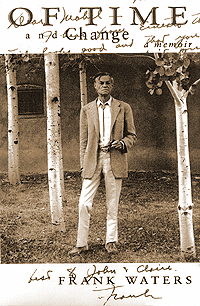

|

Frank Waters Remembers.
By Gregory McNamee
Of Time and Change, by Frank Waters (MacMurray &
Beck). Cloth, $20.
FRANK WATERS, A well-regarded novelist and part-time Tucsonan
who died in 1995, led a charmed if sometimes difficult childhood
wandering the Southwest in the early years of this century. His
father spent much time in Indian communities in Colorado, New
Mexico, and Arizona, and he often took young Waters with him,
an education that would serve Waters well when he came to write
his classic Book of the Hopi and The Man Who Killed
the Deer. He also taught Waters the value of being footloose,
of traveling freely and keeping one's eyes open along the way,
and Waters became a keen observer of the region's people and customs.
 After his father died, Waters made his way west to Los Angeles
and later east to New York, where he worked, unhappily, as an
engineer and advertising writer. "But none of my successive
jobs and hectic marriages held any conviction of permanency,"
he writes in Of Time and Change. "I felt I was playing
roles in which I was miscast, and I had lost the thread of my
inner life."
After his father died, Waters made his way west to Los Angeles
and later east to New York, where he worked, unhappily, as an
engineer and advertising writer. "But none of my successive
jobs and hectic marriages held any conviction of permanency,"
he writes in Of Time and Change. "I felt I was playing
roles in which I was miscast, and I had lost the thread of my
inner life."
 That quest for his inner life occupies most of this series of
autobiographical vignettes, written with Waters' trademark conversational
ease. He describes with much affection the intellectual life of
the pre-World War II Southwest, when Mabel Dodge and Mary Austin
held sway over Taos and the likes of D. H. Lawrence, Georges Gurdjieff, C. G. Jung, and Andrew Dasburg were the usual cocktail companions. Waters' sketches of such people are at once respectful and humorous, as with his description of
the painter and professional liar Leon Gaspard, who claimed that
he taught Marc Chagall to draw and helped Giacomo Puccini write
his most famous opera. (Waters gently remarks that when La
Boheme was first staged in Turin in 1896, Gaspard was a 14-year-old
living on the Russian steppes).
That quest for his inner life occupies most of this series of
autobiographical vignettes, written with Waters' trademark conversational
ease. He describes with much affection the intellectual life of
the pre-World War II Southwest, when Mabel Dodge and Mary Austin
held sway over Taos and the likes of D. H. Lawrence, Georges Gurdjieff, C. G. Jung, and Andrew Dasburg were the usual cocktail companions. Waters' sketches of such people are at once respectful and humorous, as with his description of
the painter and professional liar Leon Gaspard, who claimed that
he taught Marc Chagall to draw and helped Giacomo Puccini write
his most famous opera. (Waters gently remarks that when La
Boheme was first staged in Turin in 1896, Gaspard was a 14-year-old
living on the Russian steppes).
Elsewhere Waters devotes much time to discussing his understanding
of Native American spirituality and his researches into the Otherworld.
Although his Book of the Hopi was a foundational document
in the literature of the contemporary, creepy New Age movement,
it is clear that Waters had little patience for cafeteria-style
faith; his own quest involved considerable hard work, rigorous
reading, and long conversations with leading religious thinkers
of many cultures.
Of much interest to readers of Waters' novels, and to students
of Southwestern life and letters generally, Of Time and Change
is a literate and entertaining memoir.

|
 |





